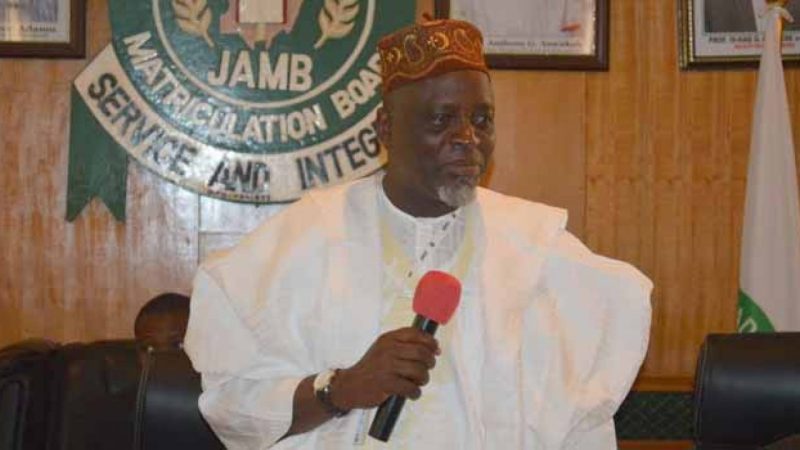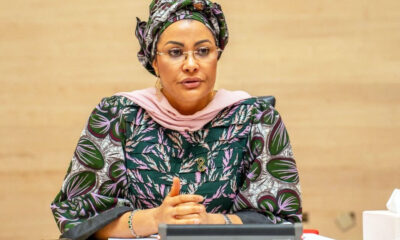Education
Kwara hijab: 10 affected schools to resume today

Kwara State government has directed the ten schools affected in the hijab controversy to resume academic activities today (Monday) in order make up for the period lost at home while the crisis lasted.
All other schools in the state are currently on holiday, and will resume on April 26, 2021.
One of the measures earlier taken by the government when the crisis ended was for the students to wait for extra hours after the normal school hours, with government providing light lunch for them and the teachers promised stipend for the extra hours.
The crisis erupted when the churches and missionary who purportedly own these schools opposed the use of Hijab in their schools as pronounced by the government that insisted that female students should be allowed to practise their religion since the schools are funded by the government.
The affected schools are C&S College Sabo Oke, ST. Anthony College, Offa Road, ECWA School, Oja Iya, Surulere Baptist Secondary School and Bishop Smith Secondary School, Agba Dam.
Others are CAC Secondary School Asa Dam, St. Barnabas Secondary School Sabo Oke, St. John School Maraba, and St. Williams Secondary School Taiwo Isale, St. James Secondary School Maraba, all in Ilorin, the state capital.
The resumption directive is contained in a press statement issued by the Permanent secretary Ministry of Education and Human Capital Development, Mrs Mary Kemi Adeosun, made available to journalists in Ilorin on Sunday.
It read, ”This is to inform parents/guardians and teachers that the 2020/2021 Third Term Academic Session for the 10 schools affected in the recent hijab debate starts on Monday, 12th April 2021. “This is part of the government’s efforts to bring the students in these schools up to speed in whatever they may have missed when their schools were shut.
“This is especially necessary for students preparing for external examinations.
“The resumption date for other schools not affected by the brief closure of schools is Monday 26th, 2021, as had earlier been communicated.
“All the teachers and staff of the affected schools should resume duty and commence classes immediately.
“The Monitoring and Inspection team of the Ministry of Education and Human Capital Development will be going round to ascertain compliance.”
Education
No Scrapping of JAMB: FG Dismisses Viral Rumours

No Scrapping of JAMB: FG Dismisses Viral Rumours
The Federal Government has firmly dismissed viral social media claims suggesting that the Joint Admissions and Matriculation Board (JAMB) has been scrapped as a requirement for tertiary institution admissions in Nigeria.
In a statement issued on Sunday, the Federal Ministry of Education described the reports as false, misleading, and entirely unfounded, stressing that Joint Admissions and Matriculation Board remains the statutory authority responsible for coordinating admissions into universities, polytechnics, colleges of education, and other tertiary institutions nationwide.
The Ministry clarified that no policy decision has been taken by the Federal Government to abolish JAMB or remove it from the admission process. It urged prospective candidates, parents, and guardians to ignore the rumour and rely solely on official government communications.
READ ALSO:
- US Adds 19 More Nigerians to ‘Worst of the Worst’ Deportation List
- Gunmen Storm Gbugbu in Kwara, Residents Flee as Panic Spreads
- FG to Launch Monthly Revenue Transparency Dashboards to Improve Fiscal Accountability
According to the statement, JAMB continues to play a central role in ensuring transparency, fairness, and standardisation through the Unified Tertiary Matriculation Examination (UTME) and the Central Admissions Processing System (CAPS).
“The attention of the Ministry has been drawn to misleading information suggesting that JAMB has been scrapped. This is not true. There is no such directive from the Federal Government,” the statement said.
The Ministry warned individuals and platforms spreading fake news to desist, noting that such misinformation creates unnecessary anxiety among candidates preparing for admission and undermines confidence in the education system.
Candidates were encouraged to continue registration and admission processes strictly in line with JAMB guidelines and instructions from accredited institutions.
Education stakeholders also cautioned against the spread of unverified reports, emphasizing that any major reform to Nigeria’s admission framework would be formally announced through official channels.
The clarification comes as registration activities for the 2026 academic admission cycle continue, with authorities reiterating their commitment to improving access, credibility, and efficiency in higher education admissions across the country.
No Scrapping of JAMB: FG Dismisses Viral Rumours
Education
Reasons Behind UniAbuja’s Expulsion of 28 Students, Withdrawal of 15 Certificates

Reasons Behind UniAbuja’s Expulsion of 28 Students, Withdrawal of 15 Certificates
The University of Abuja (UniAbuja), now renamed Yakubu Gowon University, has expelled 28 students and revoked certificates of 15 graduates following findings of serious academic and disciplinary violations.
The decision was made at the 191st Regular Meeting of the University Senate held on Thursday, January 28, 2026, after reviewing reports and recommendations from the Student Disciplinary Committee (SDC).
Reasons for Expulsion and Certificate Withdrawal
According to a statement signed by Dr. Habib Yakoob, Acting Director of Information and University Relations, the students were found guilty of offences including threats to life, physical assault, examination malpractice, conspiracy, burglary, theft, cult-related activities, possession and use of hard drugs, and falsification of O’Level results submitted during admission. Some students also failed to appear before the committee despite repeated invitations.
The 15 graduates had their certificates withdrawn for similar non-compliance, rendering their credentials null and void. Meanwhile, nine students were cleared after investigations, and 33 others received formal warnings for infractions including conspiracy, hostel racketeering, and fighting.
READ ALSO:
- Yoruba Muslim Group Dismisses Viral Ramadan Date Claim, Reaffirms Sultan of Sokoto’s Authority
- FCT Council polls: APC Wins Four Chairmanship Seats as PDP Takes Gwagwalada
- Dangote Opens Refinery Investment to Nigerians With Public Share Sale Plans
University’s Commitment to Discipline
The Vice-Chancellor and Chairman of Senate, Professor Hakeem Babatunde Fawehinmi, reaffirmed the university’s dedication to maintaining a safe, disciplined, and conducive learning environment. He emphasised that academic integrity is a core principle and that violations would be sanctioned without compromise.
Professor Fawehinmi praised the SDC for its thorough and diligent handling of cases and urged students to conduct themselves responsibly to safeguard their academic futures. He also highlighted ongoing university initiatives, including student engagement, counselling, and orientation programmes, aimed at preventing misconduct and promoting responsible citizenship and academic excellence.
The university described the actions as part of a zero-tolerance approach to misconduct, reinforcing its commitment to upholding high moral and academic standards on campus.
Reasons Behind UniAbuja’s Expulsion of 28 Students, Withdrawal of 15 Certificates
Education
UTME: JAMB Clarifies Position on Hijab During Biometric Capture

UTME: JAMB Clarifies Position on Hijab During Biometric Capture
The Joint Admissions and Matriculation Board (JAMB) has clarified that candidates are not required to remove their hijab during the Unified Tertiary Matriculation Examination (UTME) registration process.
The examination body issued the clarification following the circulation of a viral video alleging that a Muslim candidate was compelled to remove her hijab before capturing her biometric photograph at a registration centre.
In a statement addressing the controversy, JAMB dismissed claims of a policy prohibiting the use of hijab, describing such reports as misleading. The board reiterated that it respects candidates’ religious rights and does not mandate the removal of religious head coverings during registration.
READ ALSO:
- ₦13.7bn Payroll Fraud Claim Pits Audit Firm Against Osun Government
- Breaking: INEC Declares APC’s Joshua Ishaku Winner of Bwari Chairmanship Election
- FCT Poll: APC’s Maikalangu Wins AMAC Chairmanship as Collation Continues
However, JAMB explained that during biometric data capture, candidates may be asked to adjust their head coverings slightly to ensure that key facial features are visible for proper identification. According to the board, this requirement is strictly for technical purposes and aligns with standard identification procedures used in official documentation processes.
The board emphasized that the adjustment does not equate to a ban on hijabs, noting that clear visibility of facial features is necessary to meet biometric verification standards and prevent identity-related issues.
JAMB urged the public to disregard misinformation and advised candidates and parents to seek clarification through official communication channels to avoid unnecessary panic.
The clarification comes amid growing public interest in ensuring that examination procedures remain inclusive while maintaining the integrity of the registration and identification process.
UTME: JAMB Clarifies Position on Hijab During Biometric Capture
-

 International3 days ago
International3 days agoSeveral U.S. Warplanes Crash in Kuwait Amid Ongoing Iranian Strikes
-

 Politics3 days ago
Politics3 days agoWike Blasts Kingibe Over FCT Council Election Remarks
-

 International3 days ago
International3 days agoIsraeli Airstrikes Kill 31 in Lebanon as Hezbollah Loses Senior Figures
-

 Health3 days ago
Health3 days agoNigeria to Receive Breakthrough HIV Prevention Drug This Month – NACA
-

 metro1 day ago
metro1 day agoHow Ikwechegh’s ₦1.15tr Interrogation Led to Tinubu’s Cabinet Shake-Up
-

 metro2 days ago
metro2 days agoDSS Busts Alleged Arms Trafficking Network in Gombe, Seizes RPGs
-

 News2 days ago
News2 days agoRelief Radiant Hearts Foundation Launched in Iwo, Promises Hope for the Vulnerable
-

 Politics2 days ago
Politics2 days agoAtiku’s Son Resigns as Adamawa Commissioner Following Fintiri’s APC Defection















